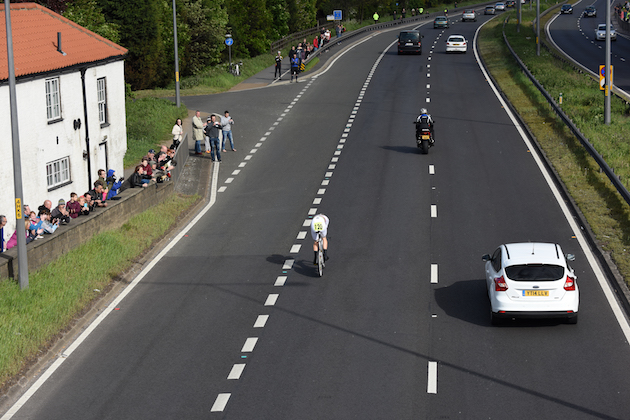Hull A63 road cycling ban: Over 9,500 letters of objection delivered to Highways England
Highways England's proposed ban on cyclists using a 15-mile stretch of the A63 near Hull is met with widespread objection


A cycling organisation has delivered over 9,500 letters of objection against a proposed ban on cycling on the A63 road near Hull.
Cycling UK hand-delivered the letters to Highways England in Leeds on Monday.
Highways England had proposed to ban cyclists from using the A63 dual carriageway between the North Cave interchange and the Daltry Street interchange – a 15-mile stretch. The road is part of the V718 time trial course and it is currently legal for cyclists to use it.
Highways England had said that it was considering applying for a Traffic Regulation Order from the Department for Transport citing safety concerns over cyclists using the road.
Head of campaigns at Cycling UK, Duncan Dollimore, branded the proposal as "nonsensical", saying: "One of Highways England’s arguments for banning cyclists is that they cannot keep up with traffic, but they’re not banning slow-moving vehicles like tractors, farm vehicles or horse and carts.
“If they ban cyclists because they cannot keep up with the traffic, then they’re going to be banned from every A-road in the country and large sections of B-roads.
Get The Leadout Newsletter
The latest race content, interviews, features, reviews and expert buying guides, direct to your inbox!
"It’s a nonsensical piece of logic and if Highways England wants to come up with reasons why cyclists shouldn’t be riding on this road, they need to come up with some evidence based reasons.”
Dollimore points out that the ban contradicts Highways England's own cycling strategy, which aims to create a cycling network across England that is suitable and safe for everyone.
http://www.youtube.com/watch?v=Hc2xrh18Rxo
A Highways England statement published by Hull Thursday Road Club, organiser of an event that uses the road, said: "Cyclists are travelling on a carriageway that carries average speeds of 65mph for traffic, at a rate of over 2,500 vehicles per hour. In the last five years there have been six accidents involving cyclists, including a fatality in 2013.
"In the interest of road safety, Highways England Company Limited is proposing to ban cyclists on this stretch of road, including associated slip roads."
>>> Why banning cyclists from the A63 road would be a terrible move
British Cycling and Welcome to Yorkshire issued a joint statement in February saying that they thought the proposed ban was "deeply concerning".
“If speed and density of traffic was accepted as a reason to ban cycling, cyclists would be banned from the vast majority of our roads. If approved, this approach will set an extremely dangerous precedent,” read the statement attributed to BC chief executive Julie Harrington and Welcome to Yorkshire chief executive Gary Verity.

Thank you for reading 20 articles this month* Join now for unlimited access
Enjoy your first month for just £1 / $1 / €1
*Read 5 free articles per month without a subscription

Join now for unlimited access
Try first month for just £1 / $1 / €1

Nigel Wynn worked as associate editor on CyclingWeekly.com, he worked almost single-handedly on the Cycling Weekly website in its early days. His passion for cycling, his writing and his creativity, as well as his hard work and dedication, were the original driving force behind the website’s success. Without him, CyclingWeekly.com would certainly not exist on the size and scale that it enjoys today. Nigel sadly passed away, following a brave battle with a cancer-related illness, in 2018. He was a highly valued colleague, and more importantly, an exceptional person to work with - his presence is sorely missed.
-
 FDJ-Suez, SD Worx-Protime, Lidl-Trek confirmed for Tour of Britain Women as strong list of teams announced
FDJ-Suez, SD Worx-Protime, Lidl-Trek confirmed for Tour of Britain Women as strong list of teams announced18 teams set to take part in four-day WorldTour stage race
By Tom Thewlis
-
 Cyclists could face life sentences for killing pedestrians if new law passed in England and Wales
Cyclists could face life sentences for killing pedestrians if new law passed in England and WalesReckless cycling currently carries a maximum two-year jail term
By Tom Thewlis